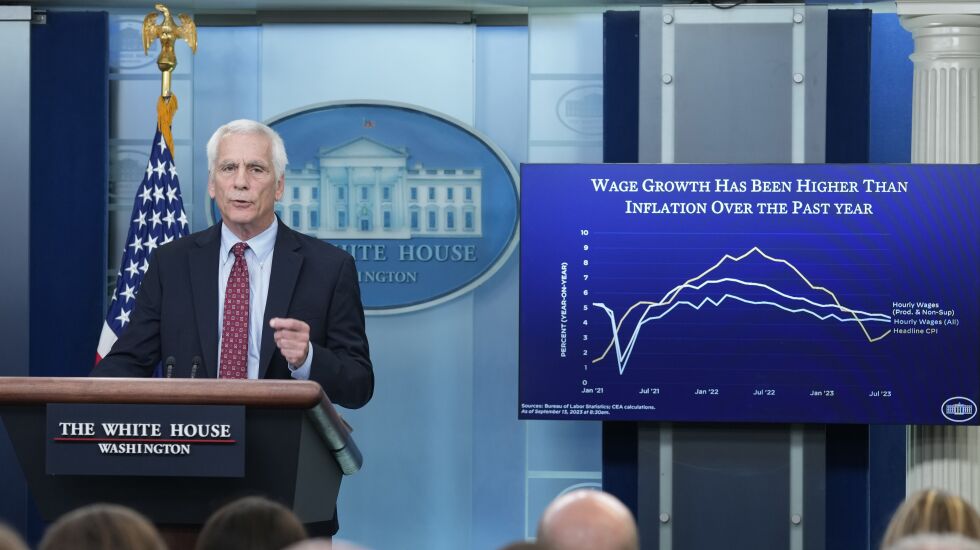
As the new year dawns, the American economy is in good shape. But the public is in a bad mood. That contradiction dominates our political life, and how voters untangle their feelings over the next 10 months could well decide the election in November.
The only real certainty is uncertainty. “Things are getting better and people think things are going to get worse — and that’s the most dangerous piece of this,” Democratic pollster Celinda Lake told the Associated Press. “Honestly, I’m kind of mystified by it.”
The statistics are, in fact, mystifying. “By many measures, the U.S. economy is rock solid,” reports the AP. Almost 200,000 jobs were created last month, reducing the unemployment rate to 3.7%. Inflation over the last year has dropped from 9.1% to 3.2%, and the economy seems headed for a “soft landing” without a recession. The Federal Reserve foreshadows future interest rate cuts, fueling a stock market boom.
And yet, gloom persists. Navigator Research polled voters in key congressional districts and found only 26% viewed the economy positively while 73% were negative. In a CNBC survey, only 33% approved of President Joe Biden’s handling of the economy, with 62% giving him poor marks.
So, what gives? Start with the persistent, and poisonous, impact of inflation — always the most damaging of all political issues. As the economic writer Annie Lowery put it in the Atlantic in 2022, “Inflation is an everyone problem and unemployment is a some-people problem.”
Much attention has focused on fuel prices, for good reason, but the real Ground Zero in the inflation war is the grocery store, not the gas station. The Atlantic conducted a national survey, trying to pinpoint the real cause of voter unhappiness, and reported: “When the results came in, one finding jumped off the screen: Americans are really, really unhappy about grocery prices.”
Yes, those prices have settled down, but they have stabilized at much higher levels than before the pandemic. And that gap, that memory, is killing voter confidence. “Collectively, there’s still this coming to grips with the idea that we’re never going back to 2019,” explained Joanne Hsu, director of consumer surveys at the University of Michigan. “We’re in a new normal now, and we’re still adjusting to what that new normal feels like.”
Economists agree there is always a lag time before perceptions catch up with reality, and that’s what Democratic strategists are counting on. As Jared Bernstein, Biden’s chief economic adviser, tells AP: “We just need more time to get these gains to working Americans — that’s our plan.”
But lingering price hikes are only part of the problem. Many households are feeling the loss of emergency pandemic relief payments, plus high interest rates are aggravating credit card debt and delinquency rates are soaring.
Moreover, as a messenger of good news, Biden faces many obstacles. Polarization is so deep that many Republicans simply refuse to believe the facts. New York magazine raises the possibility that the economic turmoil during Biden’s first two years in office “poisoned his image as an economic manager.”
No one has ever described Biden as an eloquent or inspirational leader, and he’s thrashing around for a message that works. “Bidenomics” has fallen flat as a campaign slogan. Lately the president has started blaming others for his failure to change opinion — the news media for being too negative, big corporations for “price gouging,” Donald Trump for handing him an economic mess.
“You can’t jawbone people into feeling better,” Democratic political strategist David Axelrod warned on CNN.
The lingering economic effects of the pandemic, while serious, don’t fully explain the disconnect between fears and facts. There’s something else going on. The larger impact of the pandemic goes well beyond prices. It has damaged our national confidence, our ability to believe in the future. Democratic pollster Jay Campbell said on CNBC, “people have this continued malaise about them” and added, “The fact is, bad news and difficult times stick with people much longer than good news and happy times.”
“People still seem rattled and disconnected by the shock of the pandemic,” Claudia Sahm, former Federal Reserve economist, tells AP. “People have really been jerked around. Things have been turned on and off. Everything has moved fast. It’s been disruptive and confusing. We’re just tired.”
The problem for Biden is that he seems tired, too. Can he summon the energy, and the message, to change the national mood? To lift our spirits? To restore confidence in ourselves?
Steven Roberts teaches politics and journalism at George Washington University.
The Sun-Times welcomes letters to the editor and op-eds. See our guidelines.
The views and opinions expressed by contributors are their own and do not necessarily reflect those of the Chicago Sun-Times or any of its affiliates.







